- Home
- Parnell Hall
10 Movie
10 Movie Read online
Praise for Parnell Hall’s mystery MOVIE
“Mr. Hall scores some good laughs with his sendups of obsessive movie folk and their narcissistic ways.”
—Marilyn Stasio, New York Times Book Review
“A good time ... as a bonus, you'll learn about filmmaking, and why to run the other way if you think it's going to happen to your screenplay.”
—Kirkus
“In MOVIE, Parnell skewers the denizens of filmland with undisguised relish.”
—Edward Gilbreth, Chicago Sun Times
"Delightful and humorous."
—Chattanooga Times
“The expected humor, character drawing, and fair-play plotting are all in place.”
—Jon L. Breen, Ellery Queen's Mystery Magazine
MOVIE
Parnell Hall
Copyright © 1995, 2010 by Parnell Hall
Published by Parnell Hall, eBook edition, 2010.
Published in paperback by Mysterious Press, Warner Books, Inc., 1996.
ISBN: 978-0446403955
Originally published in hardcover by Mysterious Press, Warner Books Inc., 1995.
ISBN: 978-0-892965-69-4
All rights reserved. No part of this book may be reproduced in whole or in part without written permission from the author, except by reviewers who may quote brief excerpts in connection with a review in a newspaper, magazine, or electronic publication; nor may any part of this book be reproduced or transmitted in any form or by any means, electronic or mechanical, without permission in writing from the author.
ISBN (Kindle): 978-1-936441-04-4
ISBN (ePub): 978-1-936441-05-1
Cover design by Michael Fusco Design | michaelfuscodesign.com
For Jim and Franny
Table of Contents
Chapter 1
Chapter 2
Chapter 3
Chapter 4
Chapter 5
Chapter 6
Chapter 7
Chapter 8
Chapter 9
Chapter 10
Chapter 11
Chapter 12
Chapter 13
Chapter 14
Chapter 15
Chapter 16
Chapter 17
Chapter 18
Chapter 19
Chapter 20
Chapter 21
Chapter 22
Chapter 23
Chapter 24
Chapter 25
Chapter 26
Chapter 27
Chapter 28
Chapter 29
Chapter 30
Chapter 31
Chapter 32
Chapter 33
Chapter 34
Chapter 35
Chapter 36
Chapter 37
Chapter 38
Chapter 39
Chapter 40
Other Books by Parnell Hall
1.
“I LOVE IT.”
Sidney Garfellow held the manuscript aloft and gazed at it almost reverently. He was a tall, slender man with curly black hair, wire-rimmed glasses, and a thin, sensitive face. He wrapped long, bony fingers around the manuscript, held it out at arm’s length, and said again, “I love it.”
I watched with more than passing interest. Sidney Garfellow was a hot young movie producer. What he was holding happened to be my screenplay.
Yeah, I wrote a screenplay. Which shouldn’t really surprise you. Everybody and his brother wrote a screenplay. I was in a cab the other day, and the driver had not only written a screenplay, but Al Pacino had optioned it and hired him to do a rewrite. If that was true, by the way, it was one hell of an ominous portent—the guy sold a screenplay and was still driving a cab. The old maxim for those in the arts: Don’t quit your day job.
I haven’t quit mine. I still work five days a week chasing ambulances for the law firm of Rosenberg and Stone. Stanley Hastings, private eye. Sound glamorous? Guess again. It’s a job-job, just like driving a cab or waiting tables. Something we in the arts do when the arts ain’t paying. Which is pretty much all of the time.
Except now.
Maybe.
Sidney Garfellow nodded as if in agreement with himself, said, “Love it,” one more time, and tossed the screenplay onto the coffee table.
I felt an immediate sense of loss and had a wild impulse to pick it up and hand it back to him. After all, this was my baby, my first, my one and only screenplay. I’d written it over the past year while on the job in stolen moments in hospital corridors, waiting for prospective clients to come out of surgery, or in my office, waiting for job assignments, or sometimes even in my car.
The end result was a hundred-and-ten-page screenplay entitled Trial by Fire. It was a murder mystery/courtroom drama featuring a young, unconventional, hippie lawyer. It was pretty damn good, if I did say so myself, and I was sure glad to find someone who agreed.
Particularly Sidney Garfellow. A hotshot young producer with just enough clout to get it made.
I fidgeted in my chair. I was incredibly nervous. After years and years of frustration, with the prize in my grasp, I was terrified it might slip away.
As if sensing this, my agent leaned in and said, “I just knew you’d be pleased.”
My theatrical agent, that is. As opposed to Warren, my literary agent, who handled my short stories, magazine articles, and what have you. But Manny Kricklestein was my theatrical agent. Or my Hollywood agent, if you will. He handled my screenplays. Or screenplay. And it was he who jumped in now.
We were sitting in the living room of Sidney Garfellow’s East Eighty-fifth Street apartment, the one furnished like a Hollywood home, with the framed movie posters on the walls, and the built-in projector and pull-down movie screen, somewhat of an anachronism in the days of VCRs, still a Hollywood touch.
My god, I’m telling this badly. It’s all coming out jumbled. If my screenplay were like this, there wouldn’t be a chance of getting it produced. But I was calm when I wrote it. ’Cause then production was pie in the sky. Now it’s a reality and I’m scared to death. I’m trying to describe people, places, actions, and how I felt all at once, and I can’t get any of them right.
But you gotta understand, Sidney Garfellow was not just some Hollywood studio executive who might make a recommendation. No, he was an independent producer who worked out of New York, who raised his own money and produced his own films and directed them too. He’d done two movies already, both documentaries, both critically acclaimed. One was Down and Dirty, an inside look at child pornography. The other was Straight Shooter, a brutally frank look at the AIDS epidemic. The latter had been nominated for several major awards, including the Oscar. Which put Sidney Garfellow near the top of the tree.
Sidney Garfellow leaned back in his comfortable chair, cocked his head at me. “I want to tell you how I work,” he said. “I want to give you some idea of how it’s gonna be.”
My heart nearly stopped. It was only gonna be if Sidney Garfellow said so. He hadn’t said so yet. But he was talking as if he had said so. Which was enough to drive me around the bend.
I gulped. “Yes?” I managed to croak.
“I don’t make studio deals on my pictures. At least, not in production. Distribution deal, that’s something else. But a production deal, no way. Any picture of mine, I raise the money, I produce it myself.”
I didn’t want to appear totally ignorant. “Yes, I know,” I said.
“Do you know why I do it?”
On the other hand, I didn’t want to appear a know-it-all wise ass, either. And that sounded like a rhetorical question to me.
It was. Sidney Garfellow leaned back in his chair, cocked his head, and gazed off into the distance—or what would have been the distance were it not for the wall and ceiling of his ap
artment—the posture of one obviously about to pontificate. “The reason I do that,” he said, “is so I don’t have to deal with Hollywood. If I had to point to one thing wrong with the motion-picture industry today, it’s the major studios. Run by people who can barely let down their own trousers. Staffed with executives who were potty trained yesterday. And who worked for another studio the day before yesterday. And they’re on their fourth studio now, and their only concern is not getting fired so they have to look for their fifth. ’Cause they’re dealing with so much goddamned money that every decision they make could be their job. Which creates a breed of people ten percent of their job is making movies, and ninety percent of their job is protecting their backsides. Now how the hell you gonna make a decent movie like that?”
That struck me as halfway between a rhetorical question and one where a response might be required. I had just opted for the latter and opened my mouth to say, “You can’t,” when Sidney Garfellow said it for me.
“You can’t. Obviously. All you can do is grind out carbon copies of last year’s successes. And hope like hell they’re competent enough someone will shell out money to see them in the event that trend hasn’t run its course yet.” He shook his head. “It’s a sad and sorry business.”
In the pause that followed that, I was at a loss as to what to say next. If I wanted to be absolutely honest with the man, what I would have said was, “Sidney, I’ll agree with anything you want as long as you make my movie.” But maybe it wasn’t quite the time to be that honest.
Fortunately, Sidney forged ahead. “No,” he said. “Studios are out. When I make a movie, it’s gotta be the movie I want to make. I raise the money myself, and answer to no one but me. The only drawback is, that means working with a smaller budget. But it’s worth it in order to make something of quality. And in the long run it pays off. If a two-million-dollar picture does the same business as a twenty-million-dollar picture, who makes money? You see what I mean?”
That was not a rhetorical question. I came in smoothly with, “Of course,” feeling proud of myself for recognizing it instantly.
Sidney Garfellow nodded. “Good,” he said. “Then you understand what I’m about to say. I think you’re a fine writer. I would love to pay you a hundred thousand dollars for this project. Unfortunately, it is not in the budget.”
I felt an incredible rush of adrenaline. And I suddenly found myself in the grip of half-a-dozen conflicting emotions.
First, there were the words a hundred thousand. That triggered alarm bells in my head. Well, not alarm, really. More like ecstacy. A hundred thousand, you see, was just the range of the magical phrase six figure, as in six-figure sum, six-figure advance, six-figure salary. “Yes, I’m making six figures.” “Damn, I had a six-figure tax year.” “No, I couldn’t consider less than six figures.”
Yeah, yeah, I understand. He was saying he couldn’t pay me six figures. But that didn’t matter. He had mentioned it in terms of a payment, even if it was one I could not have. I could envision myself describing this conference later. “Well, a six-figure fee was mentioned.”
But never mind that. The guy wanted my screenplay! Even if he only wanted to pay me a buck ninety-five, it didn’t matter. My screenplay was going to be made! All this was just business, bargaining. So I’d been told I can’t have a hundred thousand dollars. What can I have? Whatever it is, I’ll take it. Oh, my god, I’m no good at these business things, what should I do?
And then the sudden huge rush of relief. I don’t have to do anything. My agent’s sitting right here.
I turned to Manny, a little guy with a thin mustache and a sensitive, twitchy nose, who always reminded me of a rat—though, to be fair to him, maybe that’s just because he dealt in the movie business.
Manny put up his hands and jumped right in, his beady eyes gleaming and rat nose twitching, smelling the ten percent. “Hey, Sidney,” he said. “You don’t have to spell it out. We know how it is. And I have to tell you, from a creative point of view, Stanley’s pretty damn happy Hollywood won’t be involved.” He shrugged. “Still, the man has to eat.”
I tuned out. Let them haggle over money. I really couldn’t care. Well, yes of course I did, but it was really so secondary. The guy was going to make my movie. Sidney Oscar-nominee Garfellow was going to make my movie. The characters I’d created were going to come to life and dance across the silver screen spouting my dialogue. And be seen by millions of people. Reviewed by critics. Who, were they rational human beings, would have to agree with Sidney Garfellow that it was head-and-shoulders above the usual Hollywood drivel.
So, yes, the money would be nice, but it sort of paled into insignificance in the light of a dream come true.
I crashed back to earth amid a torrent of such terms as Writers Guild scale, low-budget minimums, deferred payments, and union waivers. All of that sounded like a hell of a lot less than a hundred grand.
It was.
But when the dust had cleared, and when my agent Manny Ratface Ten-percent had signed me up for what sounded akin to penal servitude—the bottom line of which was, not only would I not be able to quit my day job, I’d be lucky to afford a leave of absence while they filmed the movie—nonetheless, there was not a happier man on this planet.
“So,” Sidney Garfellow said, “now that we’ve got the sordid money stuff out of the way, the only possible obstacle to our working together is whether we can agree artistically.”
“I’m sure we can,” I said.
“I’m glad to hear it,” Sidney said. “To begin with, how much do you know about karate?”
I blinked. “Karate?”
“Yes. What’s your background in karate? What do you know?”
I took a breath. Artistic agreement, indeed. There were no karate scenes in my courtroom drama, nor did I wish there to be.
Still, it’s amazing what one will do when one does not yet have a screen credit. “Well,” I said, “as a matter of fact, my son Tommie is taking karate lessons in the neighborhood and just got his blue belt.”
He waved it away. “No, no. I don’t mean real karate. I mean motion-picture stuff. What karate movies have you seen?”
Good lord. I racked my brain for the title of a karate movie. Came up empty.
“No problem,” he said. “You can rent the video cassettes. Bruce Lee. Jean-Claude Van Damme. Watch a bunch of ’em, get some background.”
“I’m sorry. Jean-Claude who?”
“Jean-Claude Van Damme.” He looked at me. “You’ve never heard of him? He’s the hottest thing going.” He frowned. “We really should talk after you’ve seen the movies. No sense going over old ground. I’d like to have you on my wavelength when we start this. How’s next Tuesday? Let’s get together again next Tuesday. In the meantime, think about the women.”
“The women?”
“Yeah. We’re gonna need hot babes in this. At least four, maybe five. Young, big tits, look like they stepped out of a centerfold. But it can’t read that way in the script. They gotta have separate personalities. Like there was some point to their being in this movie aside from how they look. You follow?”
No, I didn’t. “I’m sorry,” I said. “But ... well, you read my screenplay. There’s nothing in it about karate or four hot babes.”
“Of course not,” he said. “But that doesn’t mean you couldn’t write it.”
“Well, I could,” I said. “But ...”
“But what? So write it.”
“Yes, but—” I jerked my thumb at the screenplay. “That’s a very tightly plotted script. I just don’t see how I can add all that.”
Sidney Garfellow frowned. “Add? What do you mean, add? Who’s asking you to add? I’m asking you to write a karate movie with four hot babes.”
I still didn’t get it. Or maybe I just didn’t want to. “But,” I said, “what about my screenplay?”
He looked at me. Made a face. “What, are you nuts? A courtroom drama? The country’s fed up to here with Perry Mason
and Matlock. We gotta give ’em something that sells.”
Which is how I came to write the screenplay for Hands of Havoc, Flesh of Fire.
2.
SIX MONTHS LATER WE WENT into preproduction. Which, believe me, is pretty damn fast. Especially considering I had to write the screenplay first. I finished the first draft in two and a half months, which was pretty amazing considering I did it in my spare time while working full time for Rosenberg and Stone.
And considering the interference of Sidney Garfellow, who was constantly calling me up and wanting to give me input. And practically every time he did, it knocked something I’d just written into a cocked hat and I’d have to tear it up and start over. Eventually, this produced a Pavlovian response where every time the phone rang I cringed.
Still and all, somehow I managed to get it done.
I must say, I had very mixed feelings about it. A karate movie with four hot babes is not the sort of thing I would ever write. Still, having been forced into it, I had done the best job possible. Which allowed me to take a certain amount of pride in my work. It was, in my humble estimation, the best damn karate movie with four hot babes in it ever written.
Only you wouldn’t have known it to talk to Sidney Garfellow. When he read my first draft, he had an amazing number of things he wanted changed.
In a way, I was pleased to hear it. Because my Writers Guild contract did have a provision for a second draft, if Sidney Garfellow wished to pay for it. Since my contract wasn’t that lucrative, I could use all the money I could get.
Only I couldn’t get it. See, Sidney Garfellow didn’t want a second draft. He wanted changes made in this draft.
I hemmed, I hawed, I begged, I pleaded, I called my agent, but Sidney said it was a low-budget production and there was no money, and in the end the bottom line was, if you’re a writer and you don’t have a screen credit, you’ll do just about anything to get one.
Anyway, I wrote the revisions, the revisions of the revisions, and the fine tuning of the revisions of the revisions, etcetera, etcetera, and if the truth be known, I was still fiddling with it when we went into preproduction six months later.

 Clicker Training
Clicker Training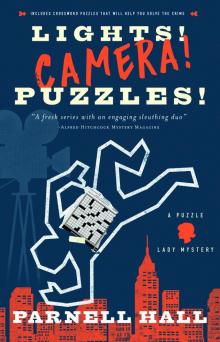 Lights! Camera! Puzzles!
Lights! Camera! Puzzles!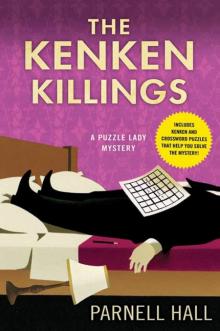 The KenKen Killings
The KenKen Killings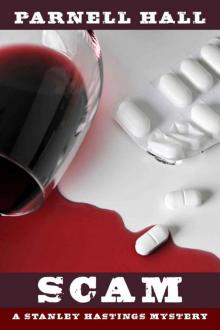 12-Scam
12-Scam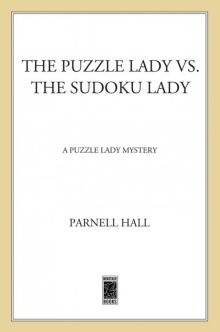 The Puzzle Lady vs. the Sudoku Lady
The Puzzle Lady vs. the Sudoku Lady 2 Murder
2 Murder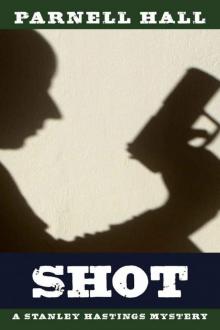 7 Shot
7 Shot You Have the Right to Remain Puzzled
You Have the Right to Remain Puzzled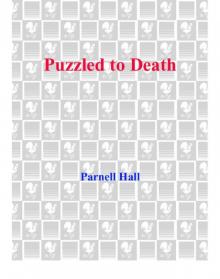 Puzzled to Death
Puzzled to Death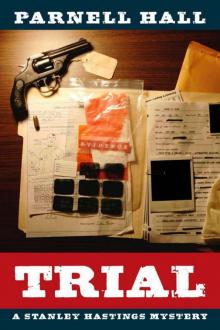 11-Trial
11-Trial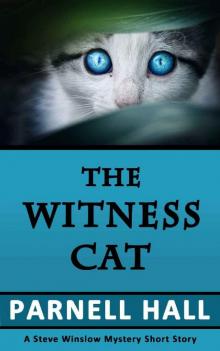 The Witness Cat (Steve Winslow Mystery)
The Witness Cat (Steve Winslow Mystery) With This Puzzle, I Thee Kill
With This Puzzle, I Thee Kill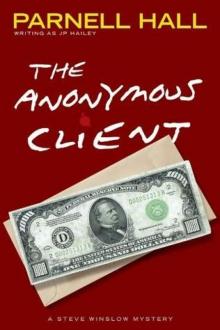 The Anonymous Client sw-2
The Anonymous Client sw-2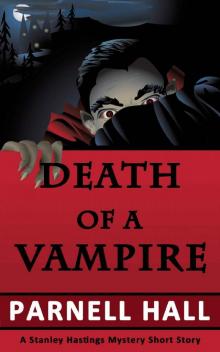 Death of a Vampire (Stanley Hastings Mystery, A Short Story)
Death of a Vampire (Stanley Hastings Mystery, A Short Story)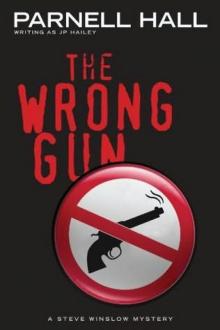 The Wrong Gun sw-5
The Wrong Gun sw-5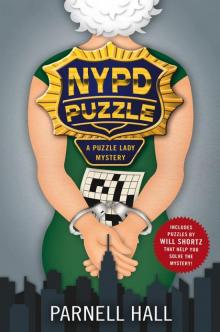 NYPD Puzzle
NYPD Puzzle 6 Juror
6 Juror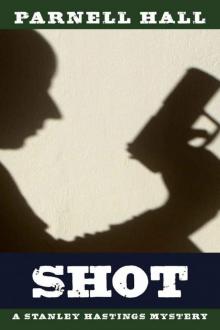 07-Shot
07-Shot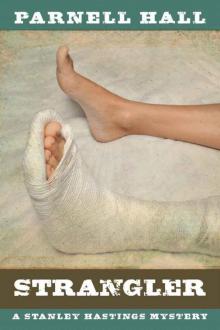 04-Strangler
04-Strangler 02-Murder
02-Murder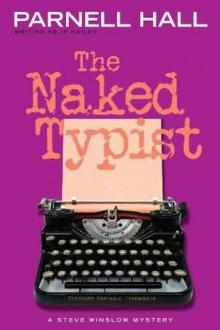 SW04 - The Naked Typist
SW04 - The Naked Typist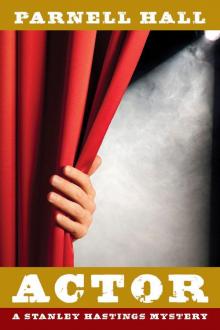 Actor
Actor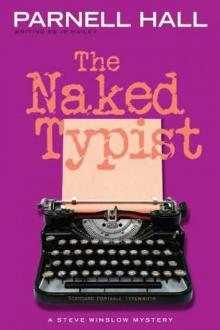 The Naked Typist sw-4
The Naked Typist sw-4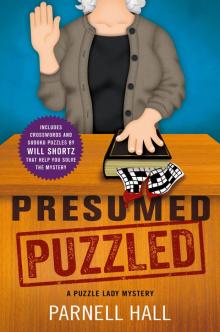 Presumed Puzzled
Presumed Puzzled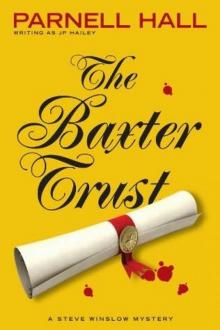 SW01 - The Baxter Trust
SW01 - The Baxter Trust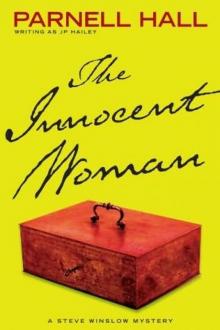 SW06 - The Innocent Woman
SW06 - The Innocent Woman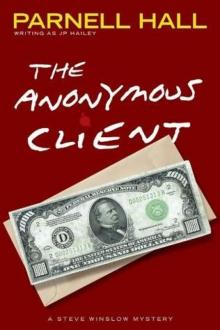 SW02 - The Anonymous Client
SW02 - The Anonymous Client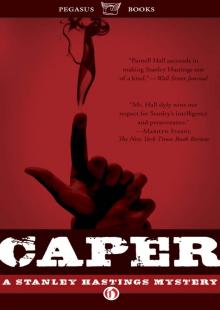 Caper
Caper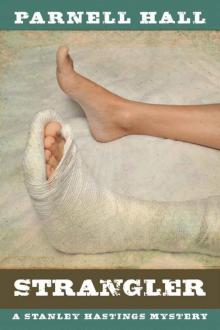 4 Strangler
4 Strangler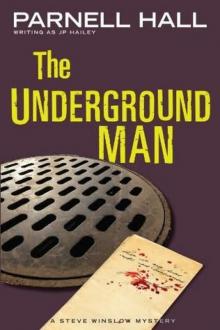 The Underground Man sw-3
The Underground Man sw-3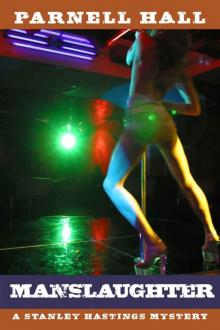 Manslaughter (Stanley Hastings Mystery, #15)
Manslaughter (Stanley Hastings Mystery, #15)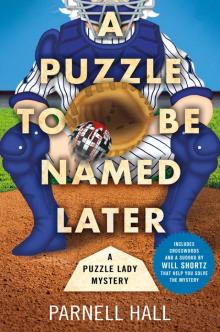 A Puzzle to Be Named Later--A Puzzle Lady Mystery
A Puzzle to Be Named Later--A Puzzle Lady Mystery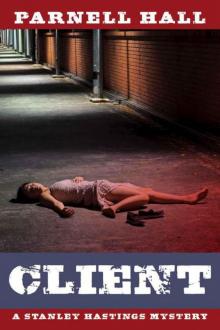 05-Client
05-Client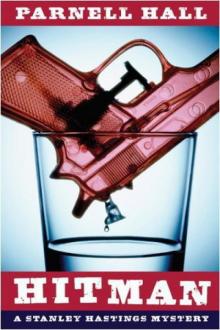 16 Hitman
16 Hitman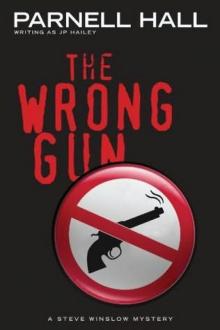 SW05 - The Wrong Gun
SW05 - The Wrong Gun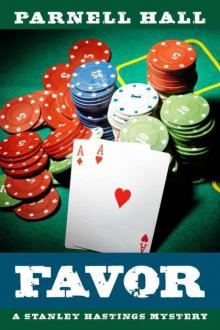 3 Favor
3 Favor Last Puzzle & Testament
Last Puzzle & Testament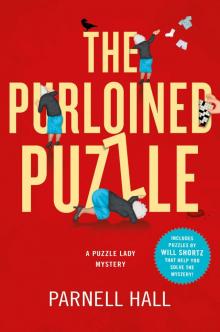 The Purloined Puzzle
The Purloined Puzzle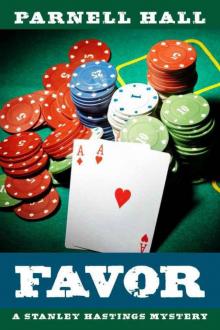 03-Favor
03-Favor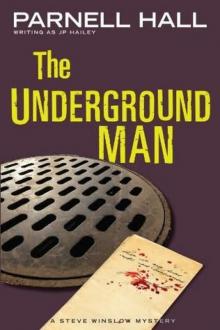 SW03 -The Underground Man
SW03 -The Underground Man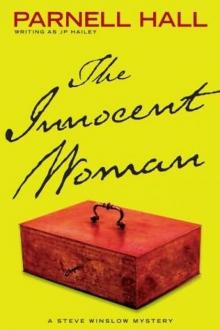 The Innocent Woman sw-6
The Innocent Woman sw-6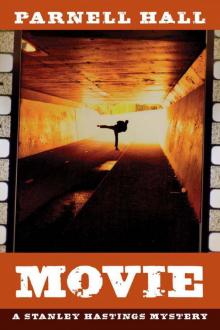 10 Movie
10 Movie 06-Juror
06-Juror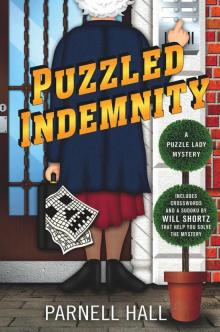 Puzzled Indemnity
Puzzled Indemnity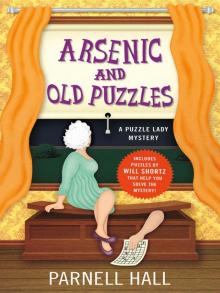 Arsenic and Old Puzzles
Arsenic and Old Puzzles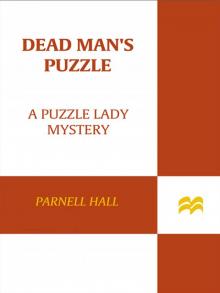 Dead Man's Puzzle
Dead Man's Puzzle Safari
Safari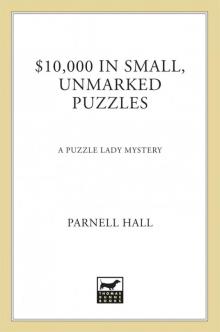 $10,000 in Small, Unmarked Puzzles
$10,000 in Small, Unmarked Puzzles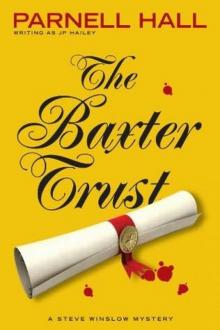 The Baxter Trust sw-1
The Baxter Trust sw-1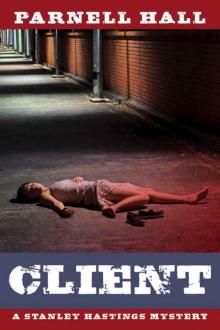 5 Client
5 Client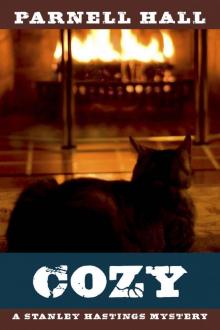 Cozy (Stanley Hastings Mystery, #14)
Cozy (Stanley Hastings Mystery, #14)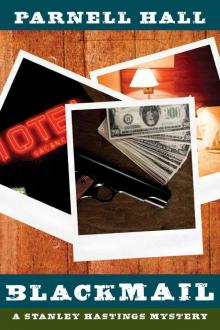 Blackmail
Blackmail A Puzzle in a Pear Tree
A Puzzle in a Pear Tree A Clue for the Puzzle Lady
A Clue for the Puzzle Lady Clicker Training (Stanley Hastings Mystery, A Short Story)
Clicker Training (Stanley Hastings Mystery, A Short Story)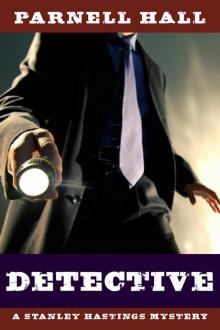 Detective (Stanley Hastings Mystery Book 1)
Detective (Stanley Hastings Mystery Book 1) 13 Suspense
13 Suspense